Background
Roy Lavon Brooks was born on March 7, 1950 in New Haven, Connecticut, United States to the family of a union official Freeman Brooks and a homemaker Ruth Andersen.

Brooks studied for Bachelor of Arts at University of Connecticut graduating it magna cum laude in 1972.
In 1975 Brooks qualified as a Juris Doctor at Yale University.
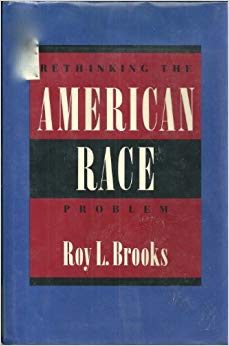
(If the conservative view of the American race problem is ...)
If the conservative view of the American race problem is frightening, the traditional liberal view seems impotent. Analyzing the race problem from neither right nor left, Brooks sheds a new and clarifying light on America's longest running social and moral dilemma. This incisive book provides a bold new examination of the seemingly intractable racial problems confronting Americans at the end of the twentieth century. In a wide-ranging and probing study, Brooks calls into question the prevailing wisdom about racism, civil rights legislation, and the composition of the Black community, going on to offer a dramatic new approach to the race problem. In Brooks' mind, civil rights laws-laws targeted at racial discrimination have not only failed to engender racial equality but have in fact had a negative effect on the standard of living of many Blacks. Brooks defines the American race problem so as to carefully separate racial oppression from (economic) class oppression and explains how civil rights legislation since the 1960s has hurt Black Americans of every class. He offers a strategy for resolving the country's racial inequities, unique in its attentiveness to class division in Black society, that combines governmental remedies and an unprecedented program of Black self-help. While Brooks argues that the government has the means to resolve the race dilemma, he suggests that it lacks the spirit to do so. Thus, it may be time for Black Americans to come to grips with an unpleasant reality namely, that they can count on the government only for minimal alleviation, and must take on the larger portion of responsibility for resolving the American race problem themselves. Certain to arouse controversy, Rethinking the American Race Problem offers new understandings of issues often clouded by misconceptions and backward notions. It is an important book for anyone concerned about the current state of race relations in America.
https://www.amazon.com/gp/product/0520068866/?tag=2022091-20
1990

(Integrated in principle, segregated in fact: is this the ...)
Integrated in principle, segregated in fact: is this the legacy of fifty years of "progress" in American racial policy? Is there hope for much better? Roy L. Brooks, a distinguished professor of law and a writer on matters of race and civil rights, says with frank clarity what few will admit--integration hasn't worked and possibly never will. Equally, he casts doubt on the solution that many African-Americans and mainstream whites have advocated: total separation of the races. This book presents Brooks's strategy for a middle way between the increasingly unworkable extremes of integration and separation. Limited separation, the approach Brooks proposes, shifts the focus of civil rights policy from the group to the individual. Defined as cultural and economic integration within African-American society, this policy would promote separate schooling, housing, and business enterprises where needed to bolster the self-sufficiency of the community, without trammeling the racial interests of individuals inside or outside of the group, and without endangering the idea of a shared Americanness. But all the while Brooks envisions African-American public schools, businesses, and communities redesigned to serve the enlightened self-interest of the individual. Unwilling to give up entirely on racial integration, he argues that limited separation may indeed lead to improved race relations and, ultimately, to healthy integration. This book appears at a crucial time, as Republicans dismantle past civil rights policies and Democrats search for new ones. With its alternative strategy and useful policy ideas for bringing individual African-Americans into mainstream society as first-class citizens, Integration or Separation? should influence debate and policymaking across the spectra of race, class, and political persuasion.
https://www.amazon.com/gp/product/0674132955/?tag=2022091-20
1996
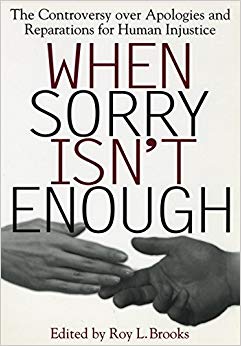
("How much compensation ought to be paid to a woman who wa...)
"How much compensation ought to be paid to a woman who was raped 7,500 times? What would the members of the Commission want for their daughters if their daughters had been raped even once?" - Karen Parker, speaking before the U.N. Commission on Human Rights Seemingly every week, a new question arises relative to the current worldwide ferment over human injustices. Why does the U.S. offer $20,000 atonement money to Japanese Americans relocated to concentration camps during World War II, while not even apologizing to African Americans for 250 years of human bondage and another century of institutionalized discrimination? How can the U.S. and Canada best grapple with the genocidal campaigns against Native Americans on which their countries were founded? How should Japan make amends to Korean "comfort women" sexually enslaved during World War II? Why does South Africa deem it necessary to grant amnesty to whites who tortured and murdered blacks under apartheid? Is Germany's highly praised redress program, which has paid billions of dollars to Jews worldwide, a success, and, as such, an example for others? More generally, is compensation for a historical wrong dangerous "blood money" that allows a nation to wash its hands forever of its responsibility to those it has injured? A rich collection of essays from leading scholars, pundits, activists, and political leaders the world over, many written expressly for this volume, When Sorry Isn't Enough also includes the voices of the victims of some of the world's worst atrocities, thereby providing a panoramic perspective on an international controversy often marked more by heat than reason.
http://www.amazon.com/gp/product/B004KPLL3G/?tag=2022091-20
1999
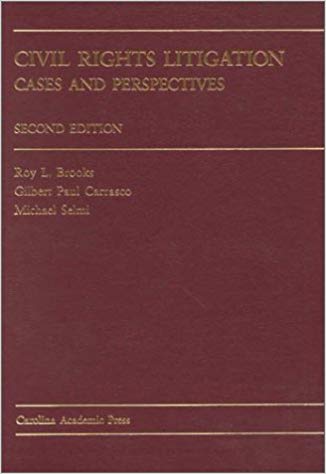
(The second edition of Civil Rights Litigation retains the...)
The second edition of Civil Rights Litigation retains the basic organization and many distinctive features of the first edition, including its broad coverage and diversity of viewpoints. Authors Brooks, Carrasco, and Selmi expose students to many different forms of discrimination, including education, housing, employment, voting, disability, language, police activities, and affirmative action. The books opening chapter offers a historical overview of civil rights litigation and raises several recurring themes in civil rights theory, including race versus class, the identity question, civil rights perspectives, and "anti-civil rights" perspectives. Each of the remaining nine chapters opens with an overview of the relevant social environment and applicable laws. As in the first edition, cases are presented with a minimum amount of editing to facilitate sophisticated class discussion or role-playing in which students argue the cases in class. Principal changes in the second edition include the usual updating of cases and secondary material as well as the restructuring of sections in several chapters. The section on civil rights perspectives in Chapter 1 has been reorganized to reflect recent clarifications in critical theory as well as the development of a new civil rights theory called "limited separation." The cases and materials have been restructured in several sections. Perhaps the most significant change has been the addition of a new co-author, Professor Michael Selmi, who replaces Judge Gordon Martin. Like Judge Martin, Professor Selmi brings both legal expertise and a different perspective to this unique collaboration. A teacher's manual is also available, and 2003 supplement is forthcoming.
https://www.amazon.com/gp/product/0890896917/?tag=2022091-20
2000
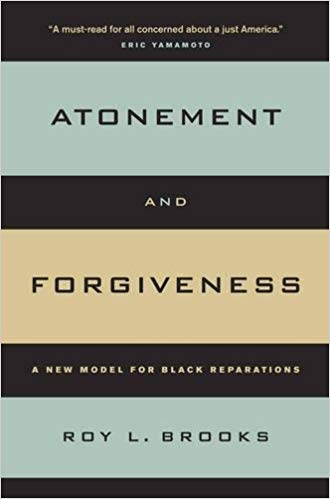
(Roy L. Brooks reframes one of the most important, controv...)
Roy L. Brooks reframes one of the most important, controversial, and misunderstood issues of our time in this far-reaching reassessment of the growing debate on black reparation. Atonement and Forgiveness shifts the focus of the issue from the backward-looking question of compensation for victims to a more forward-looking racial reconciliation. Offering a comprehensive discussion of the history of the black redress movement, this book puts forward a powerful new plan for repairing the damaged relationship between the federal government and black Americans in the aftermath of 240 years of slavery and another 100 years of government-sanctioned racial segregation. Key to Brooks's vision is the government's clear signal that it understands the magnitude of the atrocity it committed against an innocent people, that it takes full responsibility, and that it publicly requests forgiveness in other words, that it apologizes. The government must make that apology believable, Brooks explains, by a tangible act that turns the rhetoric of apology into a meaningful, material reality, that is, by reparation. Apology and reparation together constitute atonement. Atonement, in turn, imposes a reciprocal civic obligation on black Americans to forgive, which allows black Americans to start relinquishing racial resentment and to begin trusting the government's commitment to racial equality. Brooks's bold proposal situates the argument for reparations within a larger, international framework namely, a post-Holocaust vision of government responsibility for genocide, slavery, apartheid, and similar acts of injustice. Atonement and Forgiveness makes a passionate, convincing case that only with this spirit of heightened morality, identity, egalitarianism, and restorative justice can genuine racial reconciliation take place in America.
https://www.amazon.com/gp/product/0520239415/?tag=2022091-20
2004
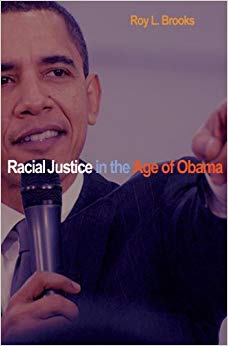
(With the election of Barack Obama as the first black pres...)
With the election of Barack Obama as the first black president of the United States, the issue of racial justice in America occupies center stage. Have black Americans finally achieved racial justice? Is government intervention no longer required? Racial Justice in the Age of Obama considers contemporary civil rights questions and theories, and offers fresh insights and effective remedies for race issues in America today. While there are now unprecedented opportunities for talented African Americans, Roy Brooks shows that lingering deficiencies remain within the black community. Exploring solutions to these social ills, Brooks identifies competing civil rights theories and perspectives, organizing them into four distinct categories - traditionalism, reformism, limited separation, and critical race theory. After examining each approach, Brooks constructs the best civil rights theory for the Obama phase of the post-civil rights era. Brooks supports his theoretical model with strong statistics that break down the major racial groups along such demographics as income and education. He factors in the cultural and structural explanations for the nation's racial divisions, and he addresses affirmative action, the failures of integration, the negative aspects of black urban culture, and the black community's limited access to resources. The book focuses on African Americans, but its lessons are relevant for other groups, including Latinos, Asians, women, and gays and lesbians. Racial Justice in the Age of Obama maps out today's civil rights questions so that all groups can achieve equality at a time of unprecedented historical change.
https://www.amazon.com/gp/product/B002W8QX4U/?tag=2022091-20
2009
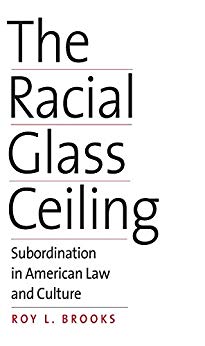
(A compelling study of a subtle and insidious form of raci...)
A compelling study of a subtle and insidious form of racial inequality in American law and culture. Why does racial equality continue to elude African Americans even after the election of a black president? Liberals blame white racism while conservatives blame black behavior. Both define the race problem in socioeconomic terms, mainly citing jobs, education, and policing. Roy Brooks, a distinguished legal scholar, argues that the reality is more complex. He defines the race problem African Americans face today as a three-headed hydra involving socioeconomic, judicial, and cultural conditions. Focusing on law and culture, Brooks defines the problem largely as racial subordination - “the act of impeding racial progress in pursuit of nonracist interests.” Racial subordination is little understood and underacknowledged, yet it produces devastating and even deadly racial consequences that affect both poor and socioeconomically successful African Americans. Brooks addresses a serious problem, in many ways more dangerous than overt racism, and offers a well-reasoned solution that draws upon the strongest virtues America has exhibited to the world. A compelling study of a subtle and insidious form of racial inequality in American law and culture. Why does racial equality continue to elude African Americans even after the election of a black president? Liberals blame white racism while conservatives blame black behavior. Both define the race problem in socioeconomic terms, mainly citing jobs, education, and policing. Roy Brooks, a distinguished legal scholar, argues that the reality is more complex. He defines the race problem African Americans face today as a three-headed hydra involving socioeconomic, judicial, and cultural conditions. Focusing on law and culture, Brooks defines the problem largely as racial subordination - “the act of impeding racial progress in pursuit of nonracist interests.” Racial subordination is little understood and underacknowledged, yet it produces devastating and even deadly racial consequences that affect both poor and socioeconomically successful African Americans. Brooks addresses a serious problem, in many ways more dangerous than overt racism, and offers a well-reasoned solution that draws upon the strongest virtues America has exhibited to the world.
http://www.amazon.com/gp/product/B0713RSW3T/?tag=2022091-20
2017
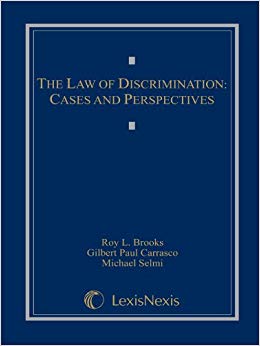
(The Law of Discrimination: Cases and Perspectives' major ...)
The Law of Discrimination: Cases and Perspectives' major pedagogical objective is to guide students through the increasingly complex field of discrimination cases and doctrine, and to offer a diversity of perspectives that underpin or challenge the canon. While most of the seminal cases included in this casebook, like most civil rights casebooks, involve discrimination based on race, The Law of Discrimination discusses protections for other classes, including women, language minorities, older workers, and the disabled. Affirmative action, an important component of discrimination law, is also covered extensively. In addition, several perspectives on discrimination law are presented. These perspectives offer students insights into intellectual frameworks that shape opinions and doctrines. They also provide students with conceptual tools for challenging received traditions in discrimination law - "thinking outside the box." In sum, this casebook covers more ground than the typical civil rights casebook. Chapter 1 opens by raising new as well as recurring themes reflected in modern discrimination law, including questions of race vs. class, racial identity, racial integration vs. racial separation, and the extent to which all racial minorities face the same race problem. Formal equal opportunity, which is the nation?s current civil rights policy and its predecessor civil rights policies are examined. The chapter ends with a presentation of both liberal and oppositional civil rights perspectives in contrast to formal equal opportunity. Chapter 1 sets the stage for a sophisticated and enlivened discussion of discrimination law. The remaining nine chapters are case-oriented and deal with specific areas of discrimination.
https://www.amazon.com/gp/product/B00ALVVHXC/?tag=2022091-20
2011
Roy Lavon Brooks was born on March 7, 1950 in New Haven, Connecticut, United States to the family of a union official Freeman Brooks and a homemaker Ruth Andersen.
Brooks studied for Bachelor of Arts at University of Connecticut graduating it magna cum laude in 1972. In 1975 he qualified as a Juris Doctor at Yale University.
Brooks served as a senior editor of the Yale Law Journal, clerked for the Honorable Clifford Scott Green of the United States District Court in Philadelphia, and practiced corporate law with Cravath, Swaine & Moore in New York City. He joined the University of San Diego School of Law faculty in 1979.
Professor Brooks teaches and writes in the areas of legal and critical theory, civil procedure, civil rights, employment discrimination, and international human rights.
("How much compensation ought to be paid to a woman who wa...)
1999(The second edition of Civil Rights Litigation retains the...)
2000(Integrated in principle, segregated in fact: is this the ...)
1996(With the election of Barack Obama as the first black pres...)
2009(If the conservative view of the American race problem is ...)
1990(A compelling study of a subtle and insidious form of raci...)
2017(Roy L. Brooks reframes one of the most important, controv...)
2004(The Law of Discrimination: Cases and Perspectives' major ...)
2011Human Rights have always been especially important for Brooks in his research.
Quotations:
“Improvement is the ultimate payoff that motivates my intellectual effort. Through my writing, I try to make life better for the have-nots and have-lesses of the world, especially those in my own backyard. I have always felt a special duty to fend for the latter. For that reason, the bulk of my writing deals with the subjects of discrimination and poverty in America. My goal is to bring insights and fresh solutions to these problems in a way that approaches the scholarship of a John Hope Franklin, the sensibility of a Robertson Davies, and the style of a Marshall Frady. Part of what motivates me to write is to keep trying until I get it right."
“Perhaps being black has something to do with why I write on human rights issues, but I have not suffered the slings and arrows of racial subordination nearly as much as many (perhaps most) blacks. Furthermore, my writing has not been dismissive of the legitimate concerns of the haves - whites, men, the wealthy, and corporations, to name a few. What inspires me most is simply the desire to use whatever talent I may have to alleviate suffering and unfairness in American society and the world at large."
“I research carefully, write fast, and edit slowly. It usually takes me several years to research a topic, spending time in both legal and nonlegal sources. Having majored in philosophy and history and minored in political science, sociology, and anthropology as an undergraduate, I am proficient in multiple venues. Writing is simply getting the information in the computer and on paper for the more difficult and protracted task of editing. I do not know if one can ever do a good job editing one’s own book, but I do spend much time trying to edit my work. I continue editing beyond publication because, for me, publication merely ends the editing process; it does not complete it.”
Roy Brooks married Penny Feller on May 9, 1970. They have two children: Whitney and Courtney.
